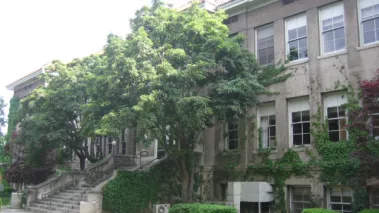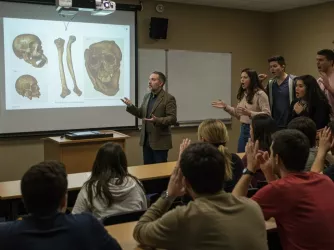Table of Contents
University of La Verne continues to ignore due process in quest to terminate law professor

Founders Hall at University of La Verne in Southern California. (Phu Nguyen/Wikicommons)
Last month, FIRE wrote to the University of La Verne asking the university to reject the College of Law Personnel Committee’s recommendation that professor Diane Klein’s tenure be “involuntarily surrendered” (that is, stripped from her). Klein, who has been on the faculty at ULV since 2004, was placed on unpaid leave earlier this year and faces revocation of her tenure for an alleged threat against assistant dean Jendayi Saada, head of the ULV College of Law’s Center for Academic & Bar Readiness.
As we explained in our previous letter, Klein’s comment was not a threat, but was protected expression criticizing a program—and the professor who runs it—at ULV. (According to American Bar Association-mandated reporting, ULV’s 2018 California bar passage rate was 32.08%.)
Now, we’ve written again asking that ULV maintain Klein’s tenure and allow her to communicate with members of the ULV community while the process to strip her of tenure remains ongoing.
FIRE requested a response from ULV by April 23, and although we did not receive one, Klein’s plight gained some attention in the media. Last week, Klein shared a link to an article about her experience with some other ULV faculty via email.
Last Thursday, Klein’s attorney received an email from ULV general counsel Doajo Hicks instructing Klein to “Cease and Desist all communication with the University.” Since Jan. 8, Klein has been subject to a communications ban with all members of the ULV community except with faculty and staff for the limited purpose of rebutting evidence or arguments against her. Now, it appears, ULV has decided to deny Klein even that limited right.
Now, we’ve written again asking that ULV maintain Klein’s tenure and allow her to communicate with members of the ULV community while the process to strip her of tenure remains ongoing.
As we explained in our previous letter, and reiterate here, Klein’s right to defend herself — and to have the ability to prepare a meaningful defense — are protected by basic principles of due process and ULV’s own procedural protections for faculty members. These procedural protections include Klein’s right to rebut evidence against her, and present evidence on her own behalf, at each stage of the process.
This protection is of particular importance in Klein’s case — prior to her initial hearing on Mar. 20, ULV provided Klein with hundreds of unorganized documents in binders purportedly supporting the assertion that she should be stripped of tenure. During the hearings, members of the committee asked two questions about her interactions with students, but not a single question about her alleged threats or any other allegations supporting the removal of her tenure. ULV continues to maintain that Klein has engaged in “similar inappropriate behavior” but “cannot provide additional details” to either the media or Klein herself. Under these circumstances, it is of vital importance that Klein be able to gather evidence in support of herself from other ULV faculty and staff in the face of these nebulous allegations.
The ULV Board of Trustees will make the ultimate decision as to whether Klein should be deprived of tenure, at which point she has the right to appeal that decision. Although FIRE continues to call on ULV to cease its efforts to revoke Klein’s tenure before this process reaches the point of appeal, if it moves forward, ULV must not deprive Klein of the right to communicate with other faculty on her own behalf concerning the allegations against her.
Recent Articles
FIRE’s award-winning Newsdesk covers the free speech news you need to stay informed.

The FCC's show trial against CBS is a political power play

UPDATE: Another federal appeals court backs academic free speech for public employees

Feds to Columbia: ‘You want $400 million in contracts back? Do this (or else)’
